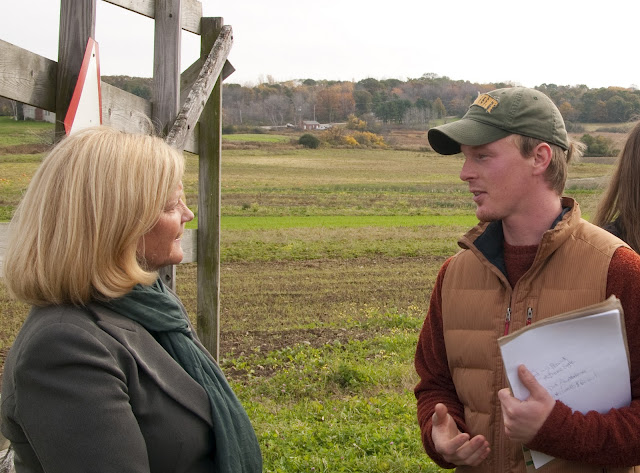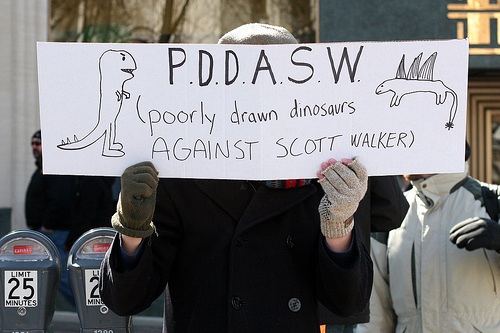
Photo by Sue Peacock.
There was an election yesterday. Perhaps you heard?
In Wisconsin, Gov. Scott Walker survived a recall attempt spurred by an approach to dealing with his opposition that William T. Sherman would have appreciated. Organized labor, a key target of Walker, invested a lot of time and energy in his defeat but, with all of the votes in, Walker defeated Tom Barrett for the second time in two years — this time, by a wider margin.
It was a triumphant victory for the way things already are. Not like we could use any world-changing or anything.
Some of the better posts on the race:
Molly Ball, The Atlantic:
[I]f the recall is not a harbinger of the presidential election, it is also not meaningless as a foretaste. The massive mobilization drive — more Wisconsinites turned out for a special election in the middle of June than turned out for the November 2010 election, a shocking feat — gave both parties a chance to test-drive and fine-tune their sophisticated voter-turnout operations, as well as a peek at what the other side is capable of. One Wisconsin Democrat involved in the presidential election told me the recall has been an invaluable opportunity to vet and refine voter lists. Republicans have similarly been boasting for weeks about the voter-contact operation they activated to get out the vote for the recall.
Jonathan Chait, New York:
Walker’s win will certainly provide a blueprint for fellow Republicans. When they gain a majority, they can quickly move to not just wrest concessions from public sector unions but completely destroy them, which in turn eliminates one of the strongest sources of political organization for the Democratic Party. And whatever backlash develops, it’s probably not enough to outweigh the political benefit. Walker has pioneered a tactic that will likely become a staple of Republican governance. Fortune favors the bold.
Ezra Klein, Washington Post:
Before the vote, the Real Clear Politics average of polls showed Walker up by 6.7 percent. He won by seven percent — about the same margin he won by in 2010. That is to say, polling was a very good guide to this election. It’s likely to be an even better guide to the national election, as there are more polls, conducted more frequently, with larger sample sizes. …
For a long time, a lot of the energy has been devoted to the question of “how do you revive the labor movement?” The truth is, at this point, you probably can’t. You can slow decline. And you can score isolated wins. But it’s hard to see a real turnaround in labor’s fortunes.
But if you take labor’s decline as a given, then another question presents itself: How do you limit the resulting corporate power over elections and legislators?
The running theme here is: What happens with labor? And the answer for that is: another question mark.
The other theme last night was disbelief that the results were called so early. People on the ground in Wisconsin saw people still standing in line to vote even as NBC called the race for Walker. The Walker campaign, too, as recapped in this great piece by BuzzFeed’s Rosie Gray, insisted that the matter wasn’t finalized until it became very, very obvious that, in fact, it was. The chair of the state Democratic party, addressing a room of Barrett supporters, insisted that they were “not going to let the media corporations decide this election” — a disingenuous attempt to keep spirits high as the ship took on water. And it led to an unusual scene: After Barrett announced his concession to a shocked audience unprepared for that inevitability, a supporter (if that’s the right term) slapped him in the face.
There were other elections, too. California held statewide elections, including a ballot proposition, Prop 29, that would have added an extra dollar in tax to the cost of a pack of cigarettes. Tobacco companies, you’ll be unsurprised to learn, opposed the measure, spending tens of millions of dollars to defeat it by a hair. Apparently defeat it, that is; the result’s not yet official.
The final theme of the evening? Money talks. Money is a loudmouth, in fact, brashly interjecting into even more demure political situations. Its role in the defeat of Prop 29 is obvious; in March, the measure was set to pass 2-to-1. Wisconsin was little different, as Mother Jones noted even before the votes came in.
Fortunes were spent — far, far more against Prop 29 and on behalf of Walker — largely in defense of the status quo. California cigarettes cost the same. Wisconsin today is little different than Wisconsin yesterday: same governor, same issues, same debates. But some consultants have fatter wallets — and a lot of Wisconsinites and Californians have woken up with a very bitter taste in their mouths.



